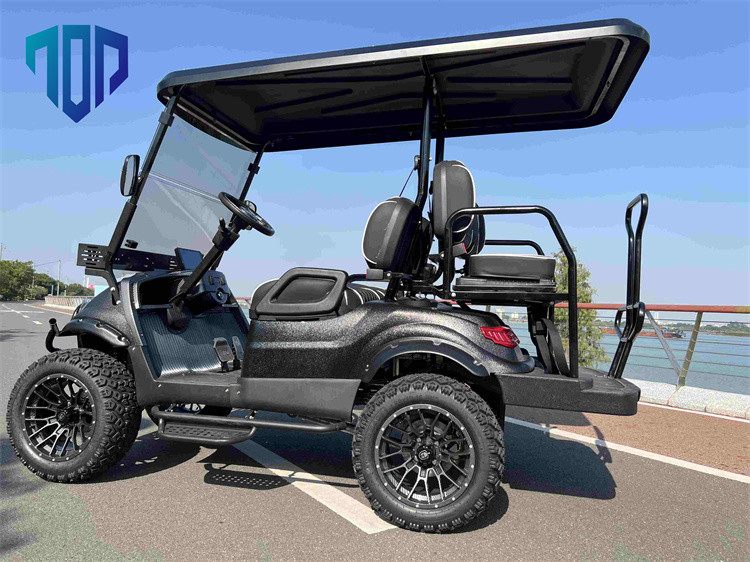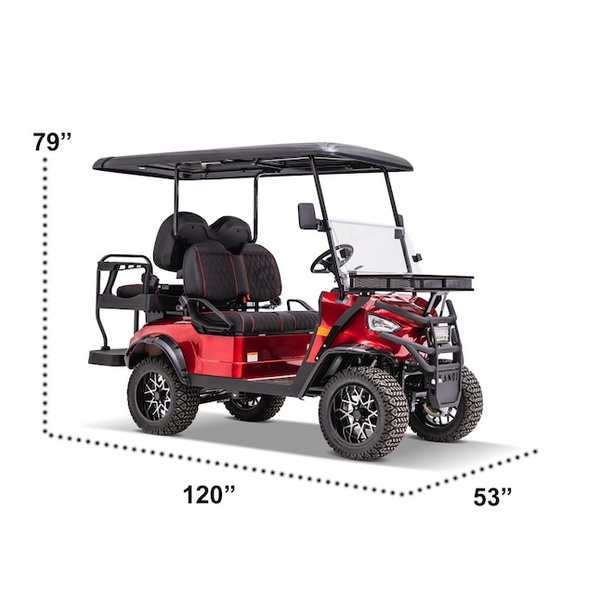Content Menu
● Understanding Electric Golf Cart Mileage
>> Average Mileage Range
● Factors Affecting Mileage
>> Battery Type:
>> Weight and Load:
>> Terrain:
>> Driving Style:
>> Temperature:
>> Maintenance:
● How to Maximize Mileage
● Real-World Examples
● Conclusion
● Frequently Asked Questions
>> 1. How far can an electric golf cart go on a full charge?
>> 2. What type of battery is best for electric golf carts?
>> 3. Does weight affect the mileage of an electric golf cart?
>> 4. How can I improve the mileage of my electric golf cart?
>> 5. What factors can decrease the mileage of an electric golf cart?
Electric golf carts have become increasingly popular for both recreational and practical uses, especially on golf courses, in gated communities, and for personal transportation. One of the most common questions among potential buyers and users is: What is the average mileage of an electric golf cart? This article will explore the factors that influence the mileage of electric golf carts, provide insights into their performance, and offer tips for maximizing their range.

Understanding Electric Golf Cart Mileage
Average Mileage Range
On average, electric golf carts can travel between 15 to 45 miles on a single charge. However, this range can vary significantly based on several factors, including the type of battery, the weight of the cart, terrain, and driving habits. Some newer models equipped with advanced lithium-ion batteries can even exceed 50 miles on a single charge.
Factors Affecting Mileage
Battery Type:
The type of battery installed in the golf cart plays a crucial role in determining its mileage. Lead-acid batteries, which are commonly used, typically offer a shorter range compared to lithium-ion batteries. Lithium-ion batteries are lighter, have a higher energy density, and can provide longer distances.
Weight and Load:
The total weight of the golf cart, including passengers and cargo, can significantly impact its mileage. Heavier loads require more energy to move, which can reduce the distance the cart can travel on a single charge.
Terrain:
The type of terrain on which the golf cart is driven also affects its mileage. Flat, smooth surfaces allow for better efficiency, while hilly or rough terrains can drain the battery faster due to increased resistance and energy consumption.
Driving Style:
Aggressive driving, such as rapid acceleration and frequent braking, can lead to higher energy consumption. Smooth, steady driving can help maximize the distance traveled.
Temperature:
Extreme temperatures can affect battery performance. Cold weather can reduce battery efficiency, while excessive heat can lead to overheating and decreased performance.
Maintenance:
Regular maintenance of the golf cart, including battery care and tire pressure checks, can help ensure optimal performance and mileage.

How to Maximize Mileage
To get the most out of your electric golf cart, consider the following tips:
- Choose the Right Battery: If you have the option, invest in a lithium-ion battery for better performance and longer range.
- Reduce Weight: Minimize unnecessary cargo and passengers to lighten the load.
- Drive Smoothly: Avoid rapid starts and stops. Instead, accelerate gradually and maintain a steady speed.
- Regular Maintenance: Keep your golf cart well-maintained, including checking the battery, tires, and brakes regularly.
- Charge Wisely: Avoid letting the battery drain completely before recharging. Regularly charging the battery can help prolong its lifespan.
Real-World Examples
Many users report varying experiences with their electric golf carts. For instance, a standard 48-volt electric golf cart with lead-acid batteries may achieve around 25 to 40 miles on a full charge under optimal conditions. In contrast, a golf cart equipped with a lithium-ion battery can often reach distances of up to 50 miles or more, depending on the factors mentioned above.
Conclusion
In summary, the average mileage of an electric golf cart typically ranges from 15 to 45 miles, influenced by various factors such as battery type, weight, terrain, and driving habits. By understanding these factors and implementing best practices, users can maximize the efficiency and range of their electric golf carts, making them a reliable choice for transportation and recreation.

Frequently Asked Questions
1. How far can an electric golf cart go on a full charge?
- On average, electric golf carts can travel between 15 to 45 miles on a single charge, with some models reaching up to 50 miles.
2. What type of battery is best for electric golf carts?
- Lithium-ion batteries are generally preferred for their longer range and better performance compared to lead-acid batteries.
3. Does weight affect the mileage of an electric golf cart?
- Yes, the total weight of the cart, including passengers and cargo, can significantly impact its mileage.
4. How can I improve the mileage of my electric golf cart?
- To improve mileage, choose a lithium-ion battery, reduce weight, drive smoothly, and perform regular maintenance.
5. What factors can decrease the mileage of an electric golf cart?
- Factors such as aggressive driving, heavy loads, rough terrain, extreme temperatures, and poor maintenance can decrease mileage.










































